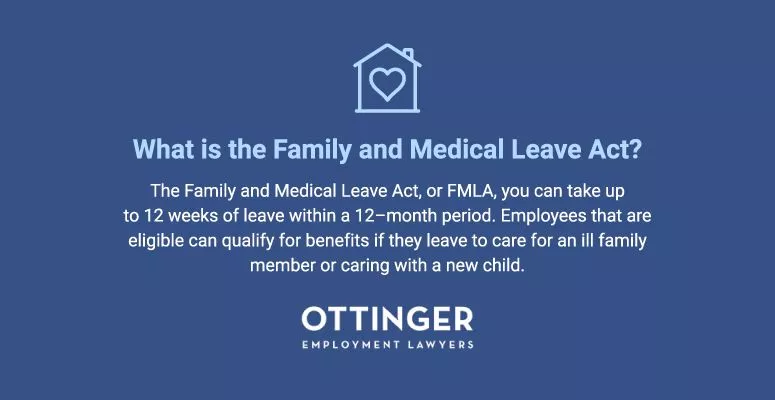Family and Medical Leave Act (FMLA) & California Family Rights Act (CFRA)

When can You Take FMLA?
Under the federal Family and Medical Leave Act, or FMLA, you can take up to 12 weeks of leave within a 12–month period when:
- You are unable to work due to a serious health condition.
- You are caring for an immediate family member with a serious health condition.
- You have a newborn child or have a child placed with you for adoption or foster care.
- There are “qualifying exigencies” arising out of a family member’s active duty or call to active duty status as a member of the National Guard, Reserves or regular armed forces.
The California Family Rights Act, or CFRA, also entitles employees in Los Angeles, San Francisco, and throughout California to 12 weeks of leave within a 12–month period for bonding with a new child, for the employee’s own serious health condition or to care for a family member with a serious health condition.
Leave under the CFRA runs concurrently with the FMLA.
Generally, leave may be taken all at once or intermittently.
However, under FMLA, intermittent leave for the purpose of bonding with a new child is subject to the employer’s prior approval.
Under the CFRA, the employer may require you to take two-week minimum increments for bonding leave.
The FMLA and CFRA laws cap out available leave for all qualifying events at 12 weeks total.
How do I Know if I am Eligible for FMLA Leave?
If your employer has at least 50 employees within a 75–mile radius it must comply with the FMLA and the California Family Rights Act. The CFRA and the FMLA have the same basic eligibility requirements: You must have worked for your employer for at least one year and you must have worked at least 1,250 hours during the 12 months just before the start of your leave. Paid time off, such as vacation or sick leave, cannot be counted toward the 1,250 hours.
Who Counts as a Family Member Under the FMLA?
Under FMLA, a spouse (including a same-sex spouse), child or parent is considered a family member, but a registered domestic partner is not. Under the California Family Rights Act, a registered domestic partner is treated the same as a spouse.
What Counts as a Serious Health Condition?
A serious health condition is any illness, injury, impairment, or physical or mental condition that causes or requires:
- Any period of incapacity or treatment in connection with or after inpatient care such as an overnight stay in a hospital
- Any period of incapacity of more than three consecutive days requiring absence from work, school or other regular daily activities with ongoing medical treatment
- Ongoing treatment by a health care provider for a chronic or long–term health condition that is incurable
- Restorative dental or plastic surgery after an injury
A chronic serious health condition is one that requires “periodic visits” (at least twice a year) for treatment to a health care provider, that continues over an extended period, and that may cause episodic rather than continuing periods of incapacity.
Voluntary cosmetic treatment is not a “serious health condition” unless it ends up requiring inpatient care due to complications. Routine preventative care is also not considered a serious health condition.
Employers may request medical certification that there is a “serious health condition” but privacy laws limit the details they may require. An employer must allow you at least 15 calendar days to obtain the medical certification.
Is Pregnancy a Serious Health Condition Under the FMLA?
Under the FMLA, pregnancy is considered a serious health condition that would qualify for leave. Pregnancy also qualifies an employee for up to twelve weeks of Pregnancy Disability Leave provided the employer has at least five employees. Pregnancy Disability Leave may be taken in addition to CFRA leave and does not have to run concurrently.
What About my Salary and Benefits While I am Taking FMLA or CFRA Leave?
Your employer is not required to pay you under the FMLA or CFRA, but they are under the California Paid Family Leave (PFL) law. The PFL provides partial pay to employees need time off to care for a sick family member or to bond with a newborn. Click here for more info on the PDL. Your employer may require you to use accrued vacation time or other accumulated paid leave. Under the CFRA, your employer cannot require you to use sick leave unless the leave is for your own serious health condition.
If you get health benefits under a group health plan, you will be entitled to continue your health insurance at the same cost as you would pay while you are working.
Can You be Fired for Taking FMLA or CFRA Leave?
No. After you take FMLA or CFRA leave, you are entitled to return to the same position unless it is no longer available.
If it is not available (due to layoff or closure, for example), then you must be offered an alternative position that is comparable in shift, work schedule, pay, benefits, location, job duties, and promotional opportunities.
If you are not given the same or a comparable position upon return from leave, the employer must prove that there was no such comparable position.
FMLA Retaliation
Companies often do not understand the FMLA and fire employees who inquire about taking leave or who take leave. This is called FMLA retaliation.
Because retaliation is so common, the FMLA expressly forbids retaliation and provides an automatic doubling of damages. FMLA retaliation cases can be very strong and easy to resolve quickly.
f you have been fired in connection with FMLA leave, contact us for a consultation.



